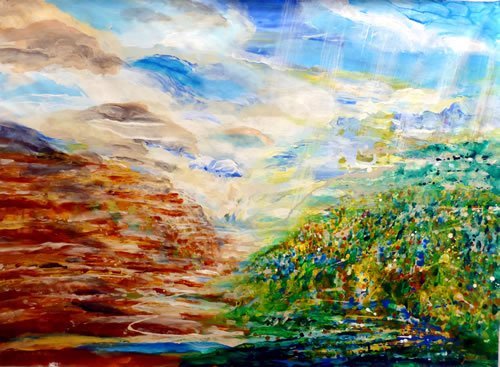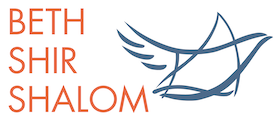
In my Torah portion, Ki Tavo, the Israelites are preparing to enter Israel and Moses is retelling the Israelites their history and trying to guide them. In the last paragraphs we learn about the many blessings and curses possible in response to the Israelites behavior. The Torah tells of a strange ritual that takes place on two opposing mountains, Mount Ebal, that is a barren mountain that represents curses, and the lush Mount Gerizim, the mountain of blessings. The tribes split in half with some going up to Mount Ebal to recite the possible curses and some going up Mount Gerizim to recite the possible blessings. The way it’s presented seems like our good or bad behavior controls the forces of nature, but I don’t see it like that. Blessings and curses, good and bad, right and wrong, are just parts of life and growth. I believe the universe unravels in such a way that we all experience good and bad, and we have the ability to find God in every situation.
Generally people think of blessings and curses as praying up to a guy in the clouds, and those prayers being returned with a “blessing”. If you’re like me, you think of curses like being turned into a frog. For me these ideas are silly like a story time – both being turned into a frog and praying up to a guy in the clouds – because I believe we are responsible for our own blessings, and our own curses. And as I studied my Torah portion I thought that we have a choice whether we think of our experiences in life as positively or negatively.
The 20th century Rabbi Abraham Joshua Heschel teaches that “deeds have serious, sometimes unknown, and long-range consequences. They possess enormous power to bring blessings or curses, rewards or punishment, fulfillment or despair. But they are also the means through which human beings celebrate or reject their partnership with God.” As I become a Bat Mitzvah, you can affect the world even with the smallest things – for good or for bad. You can help someone find their lost water bottle, and in the process accidentally make a lifelong friend. You can hold the door for someone who might be having an awful day and needs a small act of kindness to get them through. And then there are big things that may seem small like giving someone you pass on the street some food or money. That act might seem small to you but it could have a very big impact on them. The opposite is also true.
Rabbi David Hartman teaches that “the curses and blessings mentioned in Ki Tavo are useful because they add urgency to our relationship with God. They help define the consequences of our actions although there are times when such consequences are beyond our understanding.” How we act also affects this, we can bestow curses without even realizing it, like making a joke about someone, and you may think it’s funny but the person the joke is about may get really hurt by it and feel terrible. You may think that saving that banana is worth it instead of giving it to that guy on the street, but you can get another banana anytime easily, maybe they can’t. Sometimes you can’t just pray and hope for something to change, but sometimes you have to take it into your own hands and make that blessing happen. Sometimes the universe unravels in a way that is challenging and isn’t the desired outcome. How do we react then?
Scholar Lawrence A. Hoffman teaches that “prayer is a form of art through which individuals bring order, integrity, and hope into their lives. When worship works we are artists in the finest sense of affirming wholeness through the power of our traditional images of time, space, and history.” But it’s not just prayer in which we are artists shaping the world around us – it’s all of life. We have the power to create blessings or curses every day – and do – but not just with our hands.
It also depends on our mindset. Like the first person who gave a dollar to the birthday kid whose birthday was on a rainy day. We can view experiences as opportunities to bring blessing into the world, or bring curses into the world. Every day we all have the ability to make someone’s day brighter, often just with a smile or saying hi. But our mindset depends on us. Do we want to be kind and say hi or do we want to just keep doing what we were doing and ignore them. We can make so many blessings by just thinking about it positively.
Before studying my torah portion I thought of blessings and curses like “oh cool you found a penny” or “I have stubbed my toe so much today”. Now I think of blessings and curses not as some supernatural forces, but decisions we make every day without much thought, the way those decisions impact people, and our general outlook on life. Since the world is so full of curses sometimes we can’t just pray up to that guy in the sky to fix it, a lot of the time we have to take it upon ourselves to fix a lot of the problems. As our prayer book says, “Pray as if everything depended on God. Act as if everything depended on you.”
Ultimately in the end we have a choice, we can make our world as beautiful as the lush, green mount gerizim, full of blessings & life, or we can make it a dead wasteland like mount ebal full of curses. We have the choice on which mountain we want to be on; we just have to act on it.
